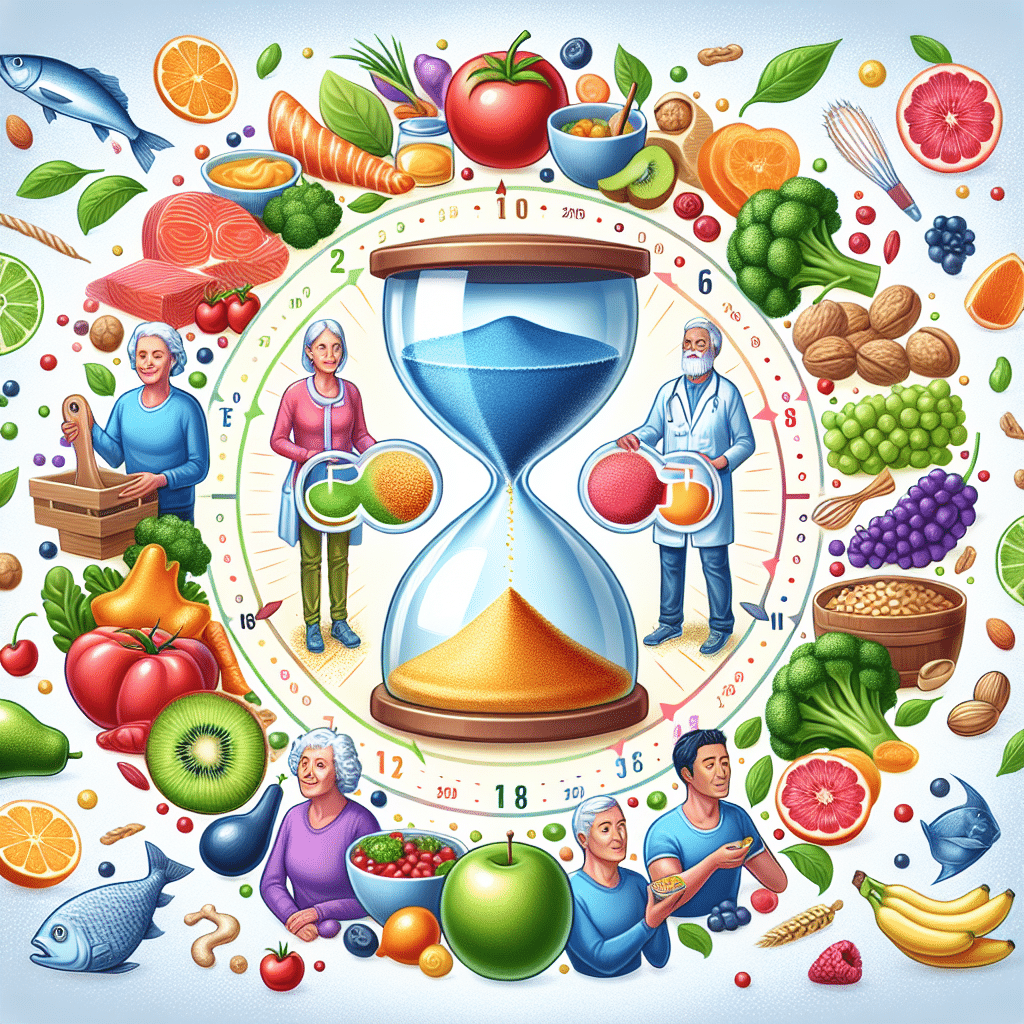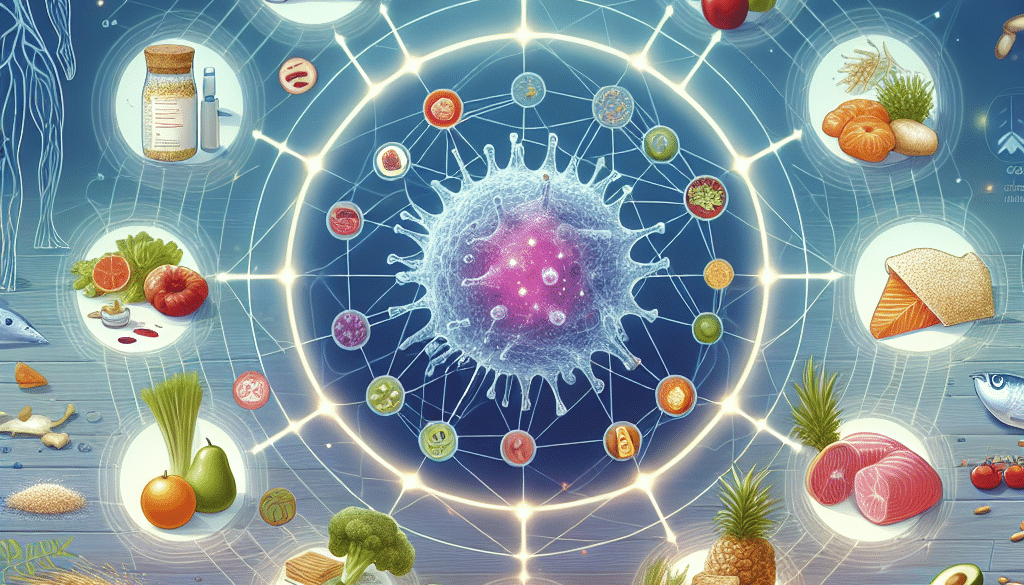Immune Health in Aging: Food’s Role in Maintenance
-
Table of Contents
- Immune Health in Aging: How Food Plays a Crucial Role
- The Aging Immune System and Nutritional Needs
- Key Nutrients for Immune Support in Older Adults
- Immune-Boosting Foods for the Elderly
- Dietary Patterns for Optimal Immune Function
- Case Studies and Statistics: The Proof in the Pudding
- Challenges and Considerations
- Conclusion: Food as Medicine for Immune Health
- ETprotein: Supporting Immune Health with Quality Protein Products
Immune Health in Aging: How Food Plays a Crucial Role

As we age, our immune system naturally begins to decline, a process known as immunosenescence. This makes us more susceptible to infections, diseases, and chronic health conditions. However, the foods we eat can play a significant role in supporting our immune health throughout the aging process. In this article, we will explore the impact of nutrition on immune function in older adults and highlight specific foods and dietary patterns that can help maintain a robust immune system.
The Aging Immune System and Nutritional Needs
The immune system is complex and involves a network of cells, tissues, and organs working together to protect the body against illness. With age, several changes occur that can weaken this system, including a reduction in immune cell production and a decrease in the body’s ability to respond to antigens. Additionally, older adults may experience micronutrient deficiencies due to a variety of factors such as changes in digestion, medication interactions, and altered dietary habits.
Key Nutrients for Immune Support in Older Adults
Several nutrients are particularly important for supporting immune health in aging. These include vitamins such as vitamin C, vitamin D, vitamin E, and B vitamins, as well as minerals like zinc, selenium, and iron. Ensuring adequate intake of these nutrients can help mitigate the effects of immunosenescence.
- Vitamin C: A potent antioxidant that can enhance immune function by supporting various cellular functions of both the innate and adaptive immune system.
- Vitamin D: Known for its role in bone health, vitamin D also modulates immune responses and a deficiency is linked to increased susceptibility to infection.
- Vitamin E: An antioxidant that helps protect cell membranes from oxidative damage and supports T-cell function.
- B Vitamins: These play a role in the production and function of immune cells. For example, vitamin B6 is crucial for the formation of antibodies.
- Zinc: Essential for immune cell development and communication and plays a role in inflammatory response.
- Selenium: An antioxidant that helps lower oxidative stress in the body, which can enhance immunity.
- Iron: Necessary for immune cell proliferation and maturation, particularly lymphocytes, associated with the body’s response to pathogens.
Immune-Boosting Foods for the Elderly
Incorporating a variety of foods rich in immune-supporting nutrients is key for older adults. Here are some examples:
- Citrus fruits: High in vitamin C, these fruits can help support the immune system.
- Fatty fish: Such as salmon and mackerel, rich in omega-3 fatty acids and vitamin D.
- Nuts and seeds: A source of vitamin E and zinc, especially almonds, sunflower seeds, and pumpkin seeds.
- Whole grains: Provide B vitamins and minerals like selenium and iron.
- Lean meats and poultry: Good sources of iron and zinc.
- Legumes: Beans and lentils are rich in B vitamins and iron.
Dietary Patterns for Optimal Immune Function
Adopting specific dietary patterns can also contribute to better immune health in older adults. The Mediterranean diet, for example, is rich in fruits, vegetables, whole grains, olive oil, and fish, providing a wide array of nutrients beneficial for immune function. Similarly, diets that emphasize plant-based foods can offer a wealth of vitamins, minerals, and antioxidants that support immune health.
Case Studies and Statistics: The Proof in the Pudding
Research has consistently shown the link between diet and immune health. For instance, a study published in the British Journal of Nutrition found that older adults who consumed more fruits and vegetables had better immune responses. Another study in the Journal of Gerontology highlighted that a higher intake of vitamin E was associated with a reduced risk of upper respiratory infections in the elderly.
Challenges and Considerations
While the importance of nutrition for immune health is clear, older adults may face challenges such as reduced appetite, dental issues, and financial constraints that can make it difficult to maintain a healthy diet. It’s important for caregivers and healthcare providers to be aware of these potential barriers and work to address them.
Conclusion: Food as Medicine for Immune Health
In conclusion, the role of food in maintaining immune health as we age is undeniable. A diet rich in essential nutrients and antioxidants is key to supporting the immune system and reducing the risk of illness. By focusing on nutrient-dense foods and adopting healthy dietary patterns, older adults can significantly improve their immune function and overall well-being.
ETprotein: Supporting Immune Health with Quality Protein Products
ETprotein offers a range of high-quality protein products that can support immune health in aging. Their organic bulk vegan proteins, including rice, pea, and various seed proteins, provide essential amino acids that are vital for the maintenance of a healthy immune system. Additionally, ETprotein’s L-(+)-Ergothioneine (EGT) products offer antioxidant properties that can further support immune function. For older adults looking to enhance their diet with immune-boosting nutrients, ETprotein’s offerings are an excellent choice.
About ETprotein:
ETprotein, a reputable protein and L-(+)-Ergothioneine (EGT) Chinese factory manufacturer and supplier, is renowned for producing, stocking, exporting, and delivering the highest quality organic bulk vegan proteins and L-(+)-Ergothioneine. They include Organic rice protein, clear rice protein, pea protein, clear pea protein, watermelon seed protein, pumpkin seed protein, sunflower seed protein, mung bean protein, peanut protein, and L-(+)-Ergothioneine EGT Pharmaceutical grade, L-(+)-Ergothioneine EGT food grade, L-(+)-Ergothioneine EGT cosmetic grade, L-(+)-Ergothioneine EGT reference grade and L-(+)-Ergothioneine EGT standard. Their offerings, characterized by a neutral taste, non-GMO, allergen-free attributes, with L-(+)-Ergothioneine purity over 98%, 99%, cater to a diverse range of industries. They serve nutraceutical, pharmaceutical, cosmeceutical, veterinary, as well as food and beverage finished product distributors, traders, and manufacturers across Europe, USA, Canada, Australia, Thailand, Japan, Korea, Brazil, and Chile, among others.
ETprotein specialization includes exporting and delivering tailor-made protein powder and finished nutritional supplements. Their extensive product range covers sectors like Food and Beverage, Sports Nutrition, Weight Management, Dietary Supplements, Health and Wellness Products, and Infant Formula, ensuring comprehensive solutions to meet all your protein needs.
As a trusted company by leading global food and beverage brands and Fortune 500 companies, ETprotein reinforces China’s reputation in the global arena. For more information or to sample their products, please contact them and email sales(at)ETprotein.com today.












